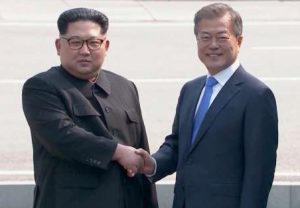Reaching out to North Korea’s secret Christians
South Korea’s largest religious radio broadcaster, the Far East Broadcasting Company, transmits gospel-centered programs to both North and South Korea every day of the week. The station’s goal is to use Christian radio to subvert the Kim regime’s strict ban on religion, and ultimately pave the way for a unified, Christianized Korean Peninsula.
North Korean programming provides audio church services–the latter because most North Koreans cannot attend local churches, or even speak about Christianity, without risking forced labor or execution.
Though it’s impossible to get an accurate count given the Kim regime’s strict controls on information, after decades of oppression, the United Nations in 2014 cited estimates that the number of Christians living in North Korea was then between 200,000 and 400,000, or around 1 percent of the country’s population.
But South Korean Christian groups like FEBC cannot meet them, or potential converts, face to face. The station has settled for what it sees as the next best thing: reaching the curious through illicit radio receivers. FEBC buys handheld radio receivers and gives them to Christian organizations that work with smugglers to get the radios into North Korea so residents can secretly listen to the station’s broadcasts.
Chung Soo Kim, who has for more than 20 years been a radio host for FEBC, where he translates California pastor Rick Warren’s sermons, estimated that the company has purchased “tens of thousands” of receivers over more than two decades. Chung Soo Kim said he recognized that while simply owning a radio is not necessarily risky, smuggling the radios into North Korea, or being caught listening to FEBC, can be dangerous.
The station has indications from defectors’ testimonies and listener feedback that its broadcasts are reaching their destination.
[The Atlantic]

 The leaders of North and South Korea embraced on Friday and pledged to work for the “complete denuclearization of the Korean peninsula” on a day of smiles and handshakes at the first inter-Korean summit in more than a decade.
The leaders of North and South Korea embraced on Friday and pledged to work for the “complete denuclearization of the Korean peninsula” on a day of smiles and handshakes at the first inter-Korean summit in more than a decade.